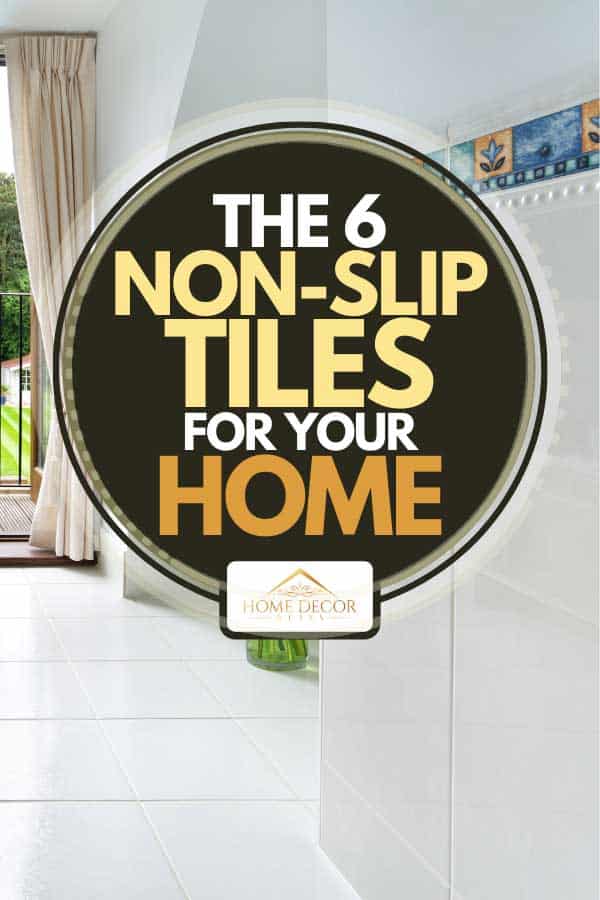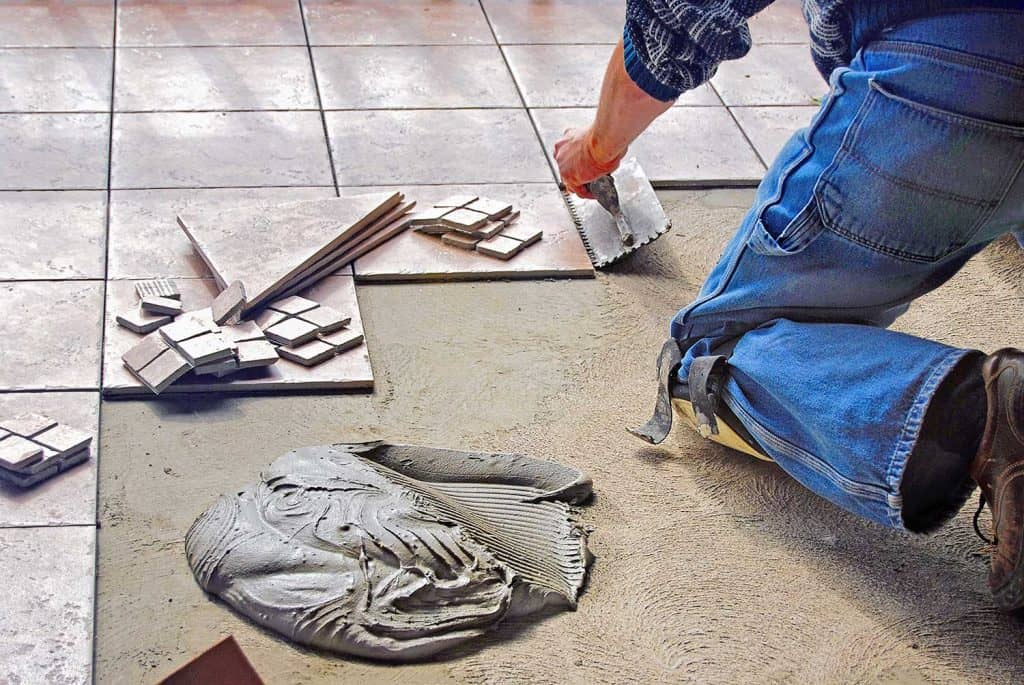Whether you are trying to make your bathroom a bit safer for young children are older adults, a non-slip flooring tile can be a great option. There are several flooring tiles to consider, all of which can be effective at making your bathroom much less hazardous. Let's take a look and some of them.
Here, we've created a list of the best non-slip flooring tiles:
- Cork
- Non-slip Vinyl
- Rubber
- Honed Granite
- Porcelain
- Quarry
Porcelain and fiberglass tubs, smooth solid stone or marble floors, and slippery shower floors can all lead to slips and falls. Some of the best areas to place non-slip tiles include the stepping area outside of a shower or a bathtub, at the front and back door entryways, on staircases, and in high-traffic hallways and foyers. In other words, the places most commonly frequented by wet shoes or bare feet.
As you can see, there are many options when it comes to non-slip tile materials. Let's discuss a few of these options in more detail.

The Best Non-Slip Tiles
We sometimes add affiliate links and content that was curated and created by our team with the help of advanced ai tools to help showcase the best design styles.

People of any age can benefit from safe non-slip flooring, but it can be especially useful in homes with small children (who are less prone to dry their feet completely) or older adults. It's important to note that different flooring options will come with their own advantages and disadvantages.
Cork
Cork is a great choice for non-slip flooring and is becoming a more popular choice for many homeowners. It's relatively easy to maintain and clean, and its washable surface can provide a recognizable cushion under your feet as well. Cork has a porous surface, which means that it would need to be sealed to minimize stains and other markings on its surface. Maintaining it can be as simple as vacuuming and sweeping it regularly.
Setbacks
Because cork's surface is so soft, it's easily susceptible to damage from punctures and dents caused by shoe heels, furniture, and other items. It's just moderately resistant to water, so any liquids spilled should be mopped or wiped up immediately.
Non-slip Vinyl
Typically, vinyl floors were not known to be non-slip until the options became available a few years ago (such as LifeProof tile). Non-slip vinyl flooring is coated with a non-slip solution, which also makes it water-resistant and more hard-wearing. It can come in a wide range of prices; it is generally one of the more affordable non-slip flooring options. The tiles can also be installed fairly easily, and it's great for DIY projects. Non-slip vinyl can work great in bathrooms as the surface is smooth but not as cold or as hard as tile flooring--making it more hospitable to bare feet.
Setbacks
One common complaint with non-slip vinyl flooring (and vinyl flooring generally) is that it feels and looks a bit like plastic. However, newer models of luxury vinyl flooring (aka "LVF") are considerably more aesthetically pleasing and can mimic stone and hardwood flooring.
Rubber
Rubber works very well as a non-slip tile and is commonly used in restaurants, professional buildings, and gyms. It's also shock-resistant and holds up well to potential damage from water, furniture, and heavy equipment. Rubber tiles can be installed fairly easily and are usually available as snap-together tiles--making them perfect for DIY installation. It's also a tiling option that's easy to maintain and care for, only requiring regular sweeping and mopping to remove dust and debris.
Setbacks
For the most part, rubber tile is pretty affordable; however, there are tile options that can get on the pricey side. While rubber may be comfortable flooring material, it is very limited in the color options, styles, and textures available.
Honed Granite
Honed granite flooring typically falls under the high-end flooring label, but it can make for a very effective non-slip tile option. This "specialty" granite has an easily recognizable matte finish and can add a bit of elegance to your room as well--as increased safety. You can typically find it in most home improvement or decor stores in a wide range of styles and colors. It's also a very durable tiling option, holding up well to daily wear and tear--not to mention, it's fairly easy to clean.
Setbacks
The biggest setback with honed granite is probably its price tag, as it can cost anywhere from $40 to $80 per square foot.
Porcelain Tiles

Porcelain is another suitable non-slip flooring tile option. It's important to know that all porcelain tiles will not be non-slip, so you'll need to check the label to ensure that you're purchasing a model that is (such as Paloma Porcelain). One of the best things about this particular towel is that it's great for those on a budget.
Porcelain tiles can come in a wide variety of colors, patterns, and designs. It's also a non-porous material, which means that it doesn't require glazing and is water-resistant as well. Porcelain is extremely resistant to daily wear and tear, and it's the go-to option for rental buildings due to its long-lasting durability.
Setbacks
Porcelain tiles generally come in various styles and designs; non-slip options may be a bit more limited--they may also be more expensive than everyday porcelain tiles. Porcelain tiles are fairly heavy and can be a bit challenging to both install and repair.
Quarry Tile
Quarry tile is a flooring option that you may not hear about often, but that works extremely well in high traffic areas such as hallways, foyers, and entryways. Why? Because it's naturally slip-resistant. Quarry has a naturally rough (and tough) surface, making it an ideal option if you're looking for flooring with a good grip.
It can easily be clean with almost any multi-purpose cleaning product or plain soap and water. You can typically find quarry tile at any home improvement store for about $8 to $14 per square foot.
Setbacks
The biggest setback of quarry flooring is that it is an unglazed stone material. It's recommended that you seal the tiles to protect them from discoloration and staining--as well as seal the grout. Also, some options for quarry tiles can be more expensive than others.
How Do You Make Your Tiles Less Slippery?
Use Anti-Slip Treads
If you are looking for a simple and inexpensive solution to add a bit of grip to your slippery tiles, non-slip treads are a great choice. These treads are most commonly used in bathrooms inside of tub or shower areas but can also be used on the flooring as well. Non-slip treads are easy to apply; all you need to do is remove the paper backing to the tread to expose the adhesive surface and press it firmly on the surface.
One of the biggest benefits of anti-slip treads is that they're really inexpensive, and they can last a considerable amount of time given that price. Also, they can be easily removed and don't require any special maintenance to stay effective.
Check out these non-slip treads on Amazon!
Lay Safety Mats
Another option how to make slippery floors safer to walk on is to lay safety mats down. These mats effectively prevent slips in the shower or bathtub or high-traffic areas of the home, such as entryways and foyers. Safety mats are also commonly used in restaurant kitchens and can come in heavy rubber options or lighter-weight options. They can also come with suctions on the bottom to help the mat adhere to the floor. You can typically find these mats in various sizes and styles, so it shouldn't be too hard to find something to suit your decor.
Check out this non-slip safety mat on Amazon!
Lay Non-Slip Rugs
Non-slip rugs are probably the most popular option for creating non-slip services on tile floors. They can be used in bathrooms, kitchens, entryways, and hallways. One benefit of non-slip rugs is that not only can they reduce fall hazards, but they can also add to your home's style and decor, as they are available in a variety of colors, sizes, and styles. You can also enhance your rugs' safety by adding a non-slip rug pad to go beneath them. Non-slip rugs and pads are typically budget-friendly.
Check out this non-slip bath mat on Amazon!
Apply an Anti-Slip Solution
You also have the option of applying an anti-slip solution to your tiles. These solutions work by adding texture to your tile by creating micro treads on top of its surface, making it less smooth and more slip-resistant. These treatments are popular with porcelain, ceramic, and stone tiles.
You don't have to worry about the solution changing the appearance or the color of your flooring. However, it's always best to do a small patch test on the floor before applying it to the entire area. Depending on the brand that you buy, it may need to be applied every few months to stay effective.
Check out this non-slip tile treatment on Amazon!
What Color Is Best For Bathroom Tiles?
It depends on your personal preference and the theme that you want for your bathroom. Most people tend to go with brown or gray color schemes in bathrooms, opting for light-colored tiles such as white, light gray, eggshell, or beige.
It's easier to start with tones that are in the middle of a color spectrum. Gray-tone tiles are becoming increasingly popular as many homeowners are opting for more modern and contemporary looks. If you are going for more traditional or rustic decor, earth tones such as brown, beige, and sand may be a better choice.
Overall most people choose to go with a fairly neutral color and can make the bathroom appear brighter and larger--light colors are best for this.
Does Tile Need To Be Sealed?
Generally, flooring tile will not need to be sealed. This is assuming that your flooring is made of a non-stone material such as linoleum or vinyl. If your flooring is made of glazed stone tiles, such as porcelain, terracotta, or ceramic, it will not need to be sealed.
If the stone tile is not glazed, its surface will be porous and require sealing to protect it from the stains and discoloration caused by everyday wear and tear. It's also important to seal porous flooring to prevent excessive water absorption, leading to mildew spots, damage, and cracks over time.
Wrapping Things Up
There are quite a few options available for creating a non-slip surface in your bathroom. We hope that this post has helped you learn about the flooring materials that may work best.
Before you go, be sure to check out our other posts:




